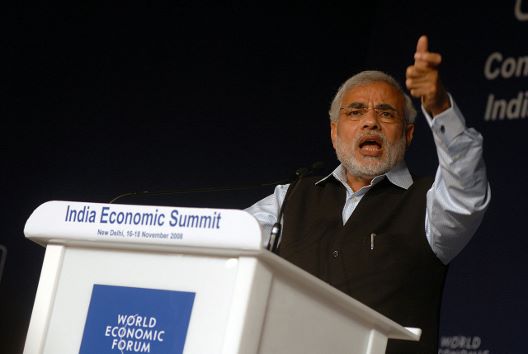
Prime Minister Modi’s Cabinet Choices May Signal How Risky His Rule Could Be
The people of India may have just earned themselves a status as the world’s most decisive electorate. They did not simply dismiss their country’s ruling Nehru-Gandhi dynasty, they humiliated it. In electing the country’s historically Hindu nationalist party to a massive majority in parliament, they have launched India into a political revolution both hopeful and fearful.
We will begin to learn this week just what that balance of hope and fear might be, as the BJP (the Bharatiya Janata, or “Indian People’s” Party) and its prime minister-designate, Narendra Modi, name the cabinet that will start interpreting the political mandate they have been given.
If you don’t normally follow Indian politics, here is why the hopes and the fears are of such Subcontinental scale:
The hopes are raised by Modi’s record as an economic modernizer and an efficient government manager who might be able to revive the once-vigorous economic growth (about 9 percent annually) and thus reduce the poverty that makes India the world’s greatest national reservoir of human misery. This hope is rooted both in Modi’s economic successes as chief minister of India’s Gujarat state and in the failures of Prime Minister Manmohan Singh, and the Gandhi family to restore growth, and even to contain political corruption even within the ranks of their own Congress party.
The fears are that Modi and the BJP might re-ignite the religious and ethnic conflicts that repeatedly have blighted India’s politics. The BJP is rooted in Hindu nationalist ideas that demand a government guided by hindutva, or “hindu-ness,” rather than the secularism and tolerance that any multi-cultural, multi-communal nation needs. Modi has been a member of a hardline Hindu movement, the Rashtriya Seva Sangh (RSS). And his failure as Gujarat’s leader in 2002 to halt massive communal riots that killed more than 1,000 people, overwhelmingly Muslims, still stirs anxiety among India’s minority groups. (Modi’s role in allowing those killings to continue over several days led the United States to bar him from receiving visas, a policy that effectively was ended Friday when President Obama called Modi to invite him to visit.)
“There has been much speculation about which Modi we will see as prime minister,” Atlantic Council senior fellow Rajan Menon wrote Thursday. Will he be “the hindutva firebrand tied to RSS discourse? … Or the manager-professional of the campaign season determined to build on his record as the architect of Gujarat’s economic success?”
Modi was elected to revive economic growth; here is what he must do.
Modi and the BJP “have not been elected primarily by sympathizers with his rightist politics but by voters, especially the young, who are tired of the Congress Party’s wooly [fuzzy, indecisive] politics and self-serving dynastic leadership and want India to grow into an economic success,” writes John Elliott, the British author and journalist based in New Delhi. “That success is surely also Modi’s primary aim, not Hindu nationalism.”
Elliott wrote yesterday with striking clarity about what Modi’s mandate seems to be, and how he may need to achieve it: “The BJP has been elected to deliver economic growth, reduced inflation, and an efficient government that takes decisions and then implements them, streamlining procedures and developing new partnerships with the private sector. India does not need new policies to be introduced to achieve most of this. What is needed is implementation of existing policies in areas ranging from power generation and coal mining to defense production and procurement, plus the operation of the railways, construction of highways, and improvement in education and health services.”
Mohan Guruswamy, an Atlantic Council senior fellow in New Delhi, suggests an area in which policies must change. Economic growth has slowed, he writes, because of “the huge shift of capital in India from investment to subsidies due to a rash of populist policies” under the Congress party’s leadership. “The economy cannot bear this huge burden [of government subsidies], now estimated to be almost a fifth of the GDP.”
As for the almost universal corruption and inefficiency of the state bureaucracy, he writes: “Public administration now accounts for almost 8 percent of the GDP. Instead of being the beast of burden to take the country forward it has now become a burdensome beast.”
We may begin to see this week how dangerous Modi’s reign might be for communal peace in India.
As to the dangers of new communal conflict under a BJP government whose parliamentary majority will unchain it from any strict need to work with coalition partners, Modi will “almost certainly ensure that there are no major riots or high-profile persecution of Muslims and other minorities, but he may have to let the fringes have some leeway,” Elliott writes.
That may lead to BJP and RSS hardliners becoming emboldened enough to incite communal violence. And it may include government sponsorship of hindutva, “as happened when the party was last in power (1998-2004), for example by rewriting school textbooks and appointing sympathizers to top positions in universities and … similar institutions,” Elliott writes.
A first signal of how far Modi may feel he must accommodate his hardliners will come this week in the appointments to ministerial posts – education, culture, human development, etc. – that oversee such issues.
James Rupert is managing editor at the Atlantic Council.
Image: As chief minister of Gujarat, a state as populous as Italy, Narendra Modi caught the attention of economists and investors with economic growth rates that reached 9 percent annually. What can he do for a country that has more people living in poverty than all of sub-Saharan Africa? (Photo: Wikimedia Commons/CC License)
